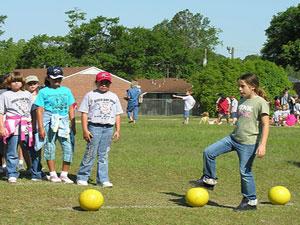Exercise for education in France
(Image by Old Shoe Woman (cc:by-ns-sa))
This article was originally covered by PRI’s The World. For more, listen to the audio above.
French high school is a stressful place, according to French Principal Bernard Lociciro. When he arrived at the Lycee Jean Vilar school in the working-class town of Meaux two years ago, only 54 percent of students managed to pass their graduation exams. Lociciro needed to change the curriculum. So he sent the kids sailing.
Lociciro instituted a program at the school where students spend their afternoons playing sports instead of learning in a classroom. After five hours of studying, the children spend their time wrestling, boxing, fencing and lawn bowling. The program is designed to improve students’ grades, attitudes and general approach to life. And Lociciro says the kids area already doing better in school.
Not everyone is convinced, however. Education expert Eric Charbonnier points out that a similar program failed in Germany, in part because low-income students couldn’t get the extra instruction they needed. As a result, they continued to lag behind higher-income students. He told PRI’s The World: “Sport all the afternoon, there’s a risk in fact that you’ll see the performance that will maybe decrease.”
For now, however, many consider the non-graded afternoons of sports a success. Teachers say that grades have improved, although they stress that it’s too early to know the long-term effects. Parents say that their children are less stressed and are spending less time in front of the computer at home. And many of the children are getting attached. One who spoke to The World said that if someone asked him to spend the afternoon in class, he would refuse.
PRI’s “The World” is a one-hour, weekday radio news magazine offering a mix of news, features, interviews, and music from around the globe. “The World” is a co-production of the BBC World Service, PRI and WGBH Boston. More “The World.”
